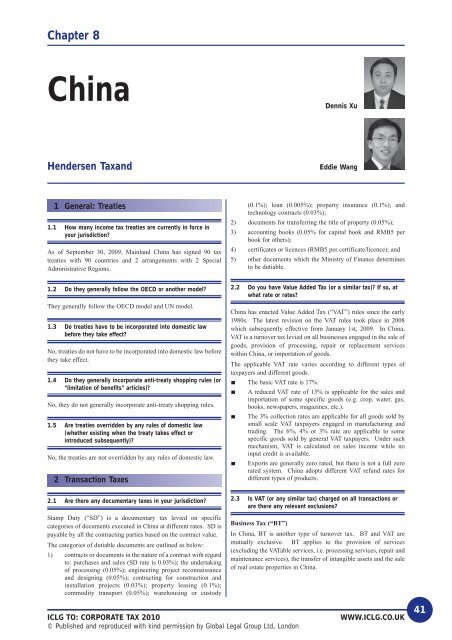Corporate Tax 2010 - BMR Advisors
Corporate Tax 2010 - BMR Advisors
Corporate Tax 2010 - BMR Advisors
You also want an ePaper? Increase the reach of your titles
YUMPU automatically turns print PDFs into web optimized ePapers that Google loves.
Chapter 8<br />
China<br />
Dennis Xu<br />
Hendersen <strong>Tax</strong>and<br />
Eddie Wang<br />
1 General: Treaties<br />
1.1 How many income tax treaties are currently in force in<br />
your jurisdiction<br />
As of September 30, 2009, Mainland China has signed 90 tax<br />
treaties with 90 countries and 2 arrangements with 2 Special<br />
Administrative Regions.<br />
(0.1%); loan (0.005%); property insurance (0.1%); and<br />
technology contracts (0.03%);<br />
2) documents for transferring the title of property (0.05%);<br />
3) accounting books (0.05% for capital book and RMB5 per<br />
book for others);<br />
4) certificates or licences (RMB5 per certificate/licence); and<br />
5) other documents which the Ministry of Finance determines<br />
to be dutiable.<br />
1.2 Do they generally follow the OECD or another model<br />
They generally follow the OECD model and UN model.<br />
1.3 Do treaties have to be incorporated into domestic law<br />
before they take effect<br />
No, treaties do not have to be incorporated into domestic law before<br />
they take effect.<br />
1.4 Do they generally incorporate anti-treaty shopping rules (or<br />
“limitation of benefits” articles)<br />
No, they do not generally incorporate anti-treaty shopping rules.<br />
1.5 Are treaties overridden by any rules of domestic law<br />
(whether existing when the treaty takes effect or<br />
introduced subsequently)<br />
No, the treaties are not overridden by any rules of domestic law.<br />
2 Transaction <strong>Tax</strong>es<br />
2.2 Do you have Value Added <strong>Tax</strong> (or a similar tax) If so, at<br />
what rate or rates<br />
China has enacted Value Added <strong>Tax</strong> (“VAT”) rules since the early<br />
1980s. The latest revision on the VAT rules took place in 2008<br />
which subsequently effective from January 1st, 2009. In China,<br />
VAT is a turnover tax levied on all businesses engaged in the sale of<br />
goods, provision of processing, repair or replacement services<br />
within China, or importation of goods.<br />
The applicable VAT rate varies according to different types of<br />
taxpayers and different goods.<br />
The basic VAT rate is 17%.<br />
A reduced VAT rate of 13% is applicable for the sales and<br />
importation of some specific goods (e.g. crop, water, gas,<br />
books, newspapers, magazines, etc.).<br />
The 3% collection rates are applicable for all goods sold by<br />
small scale VAT taxpayers engaged in manufacturing and<br />
trading. The 6%, 4% or 3% rate are applicable to some<br />
specific goods sold by general VAT taxpayers. Under such<br />
mechanism, VAT is calculated on sales income while no<br />
input credit is available.<br />
Exports are generally zero rated, but there is not a full zero<br />
rated system. China adopts different VAT refund rates for<br />
different types of products.<br />
2.1 Are there any documentary taxes in your jurisdiction<br />
Stamp Duty (“SD”) is a documentary tax levied on specific<br />
categories of documents executed in China at different rates. SD is<br />
payable by all the contracting parties based on the contract value.<br />
The categories of dutiable documents are outlined as below:<br />
1) contracts or documents in the nature of a contract with regard<br />
to: purchases and sales (SD rate is 0.03%); the undertaking<br />
of processing (0.05%); engineering project reconnaissance<br />
and designing (0.05%); contracting for construction and<br />
installation projects (0.03%); property leasing (0.1%);<br />
commodity transport (0.05%); warehousing or custody<br />
2.3 Is VAT (or any similar tax) charged on all transactions or<br />
are there any relevant exclusions<br />
Business <strong>Tax</strong> (“BT”)<br />
In China, BT is another type of turnover tax. BT and VAT are<br />
mutually exclusive. BT applies to the provision of services<br />
(excluding the VATable services, i.e. processing services, repair and<br />
maintenance services), the transfer of intangible assets and the sale<br />
of real estate properties in China.<br />
ICLG TO: CORPORATE TAX <strong>2010</strong><br />
© Published and reproduced with kind permission by Global Legal Group Ltd, London<br />
WWW.ICLG.CO.UK<br />
41
















